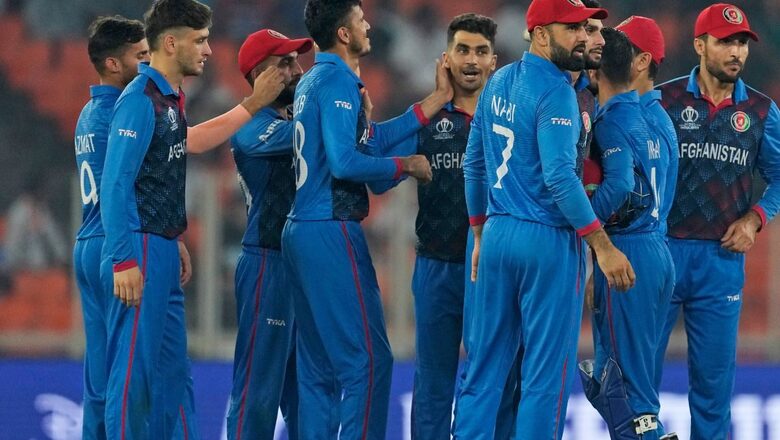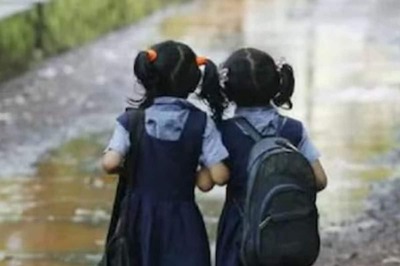
views
If there is one team in the ongoing ICC Cricket World Cup that has caught the imagination of the masses through their noteworthy performances on the field, that team is Afghanistan. This gradual rise of Afghan cricket has been an ongoing process where many players of this team first started showing their potential in the T20 format across premiere cricket leagues across the world. Then the Afghan players started to perform well as a team in the bilateral and multilateral international T20 contests. And a few days back, this team had an outside chance to qualify for the World Cup semi-finals.
Sounds like a fairy tale for a national team whose nation has been in turmoil for decades. As expected, most of the commentators, cricket pundits and fans have lauded the team’s success and rallied behind them and supported them. Their last league game against South Africa was on November 10 at the Narendra Modi Stadium in Ahmedabad. I’m giving a specific reference to this particular match as this could’ve led Afghanistan to be in the semi-finals of a World Cup, which would’ve been a historic feat for Afghan cricket.
Another reason is the history of these two nations. The International Cricket Conference (ICC) had expelled South Africa in the year 1970 because of the racial policies practised under the Apartheid policy of the then South African government. The apartheid policy of not playing against any non-white team had continued for decades by South Africa without any serious steps taken by the Imperial Cricket Council, which was the major governing body of cricket. It was only when the South African cricket board decided to object against the selection of a cricketer of coloured origin (Basil D’Oliveira) in the England cricket squad announced for South Africa, that mounted public pressure in England to take some concrete steps against South Africa. As a result, South Africa got expelled from international cricket for almost two decades until their return in 1991 at Eden Gardens against India.
Now, all this background is necessary to understand why the International Cricket Council behaved in one way (and rightly so) in the case of South Africa and chose to look the other way when it came to the question of Afghanistan which is currently under the Taliban rule. If Apartheid was inhumane and terrorised those of coloured origin and discriminated against the non-whites, then by the same yardstick isn’t the history of the Taliban even worse, much more maligned on any parameters of humanity? The pictures of people running on Kabul Airport to flee the Taliban rule are still very much alive in the minds of the people. Isn’t allowing Afghanistan to continue as an international cricket-playing nation ultimately legitimising the Taliban rule in Afghanistan?
Or, shall we see this policy of letting Afghanistan continue as an emerging cricket nation, a well-thought idea of the International Cricket Council, by which they’re not only extending an olive branch to the Taliban regime but also hoping that maybe the boom in Afghan cricket would somehow pacify the future situation within Afghanistan? It is high time that the International Cricket Council (ICC) come out clear on their stand on Afghan cricket. The scholars of international relations should seriously discuss whether South Africa’s Apartheid policy was much worse and more inhumane to the Taliban regime.
Not only the ICC, the Board of Control for Cricket in India (BCCI), which is the world’s richest and most powerful cricket body should also come out clear on this matter. The BCCI has helped to build Afghan cricket in many ways, by providing them with cricket infrastructure, cricket facilities and a home ground in Dehradun in Uttarakhand, India. Not only this, but in the Indian Premier League (IPL), the count of Afghan cricketers has seen a steady rise in the last decade.
If any nation wants to generate goodwill in the international community, it needs a soft power to gain respect and legitimacy in the eyes of other nation-states. Today, the Taliban regime in Afghanistan has precisely got this one and only major soft power via the route of cricket. If terrorism is not the question (as many liberals might argue), that sports and politics should be kept separate, and this entire commentary on Afghanistan is not needed, then isn’t this the same country that has banned bilateral cricket tournaments against Pakistan on account of terrorism after 26/11? How come we are witnessing two different policies on the same question i.e. terrorism?
When Quinton de Kock, the southpaw from South Africa didn’t take the knee to support the ‘Black Lives Matter’ movement in the 2021 T20 World Cup, a major hue and cry was witnessed (and rightly so). People said it was insensitive of him to do this but on the same account, nobody has made a hue and cry on why the international cricket community is accepting the Afghan national team under the Taliban regime. Whatever the answers are to the questions raised above, the governing bodies of cricket like the ICC and BCCI should be clear on this.
The crux of the argument is how there are two different policies on similar issues. Or do the powers think that the comparisons made here are like comparing oranges with apples? Even if that is the case, it is high time that the answers are needed on these matters.
The writer is a Doctoral Fellow at School of International Studies, Jawaharlal Nehru University, New Delhi. Views expressed in the above piece are personal and solely that of the author. They do not necessarily reflect News18’s views.




















Comments
0 comment